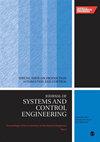Adaptive fuzzy command–filtered control strategy for electro-hydraulic braking systems of winding hoist with prescribed performance
IF 1.5
4区 计算机科学
Q4 AUTOMATION & CONTROL SYSTEMS
Proceedings of the Institution of Mechanical Engineers, Part I: Journal of Systems and Control Engineering
Pub Date : 2023-10-06
DOI:10.1177/09596518231194768
引用次数: 0
Abstract
In the braking control of winding hoisting systems, proper braking strategy is of great significance in reducing the probability of significant hidden dangers and improving the safety and reliability of the system. However, as a typical elastic and variable stiffness system, the winding hoisting systems have large nonlinearity, parameter uncertainties, random disturbances, and so on, which severely restrict the improvement of braking performance. To this end, an adaptive fuzzy command–filtered controller with prescribed performance is developed for electro-hydraulic braking systems of winding hoist in this article. First, the dynamic model of the winding hoisting system is established with consideration of the elasticity of wire rope. Based on the established dynamic model, using the fuzzy logic system, the algebraic loop problem caused by non-strict feed structure is overcome, and the unknown nonlinearities arising from modeling error, parameter uncertainties, and system disturbances are also approximated for the subsequent active unknown nonlinearities compensation. Next, to enhance the convergence rate and guarantee the position tracking error within a prescribed region, a tracking error transformation method based on the prescribed performance function is utilized. Subsequently, the adaptive fuzzy control algorithm is developed with command filters, which can also avoid the complexity explosion issue due to the analytic calculation of the derivatives of stabilizing functions, and the rigorous stability of the close-loop system is proved by the Lyapunov theory. Finally, experimental results are utilized to illustrate the effectiveness of the developed controller.规定性能卷扬机电液制动系统的自适应模糊命令滤波控制策略
在卷绕提升系统的制动控制中,合理的制动策略对于降低重大隐患发生的概率,提高系统的安全性和可靠性具有重要意义。然而,卷绕式提升系统作为一种典型的弹性变刚度系统,存在较大的非线性、参数不确定性、随机干扰等问题,严重制约了系统制动性能的提高。为此,本文针对卷扬机电液制动系统开发了一种具有规定性能的自适应模糊命令滤波控制器。首先,考虑钢丝绳弹性,建立了卷绕式提升系统的动力学模型;在建立的动态模型的基础上,利用模糊逻辑系统克服了非严格进给结构引起的代数回路问题,并对建模误差、参数不确定性和系统扰动引起的未知非线性进行了逼近,以备后续主动未知非线性补偿。其次,为了提高收敛速度并保证位置跟踪误差在规定区域内,采用了基于规定性能函数的跟踪误差变换方法。在此基础上,提出了带命令滤波器的自适应模糊控制算法,避免了稳定函数导数解析计算带来的复杂性爆炸问题,并利用Lyapunov理论证明了闭环系统的严格稳定性。最后,通过实验验证了所设计控制器的有效性。
本文章由计算机程序翻译,如有差异,请以英文原文为准。
求助全文
约1分钟内获得全文
求助全文
来源期刊

CiteScore
3.50
自引率
18.80%
发文量
99
审稿时长
4.2 months
期刊介绍:
Systems and control studies provide a unifying framework for a wide range of engineering disciplines and industrial applications. The Journal of Systems and Control Engineering refleSystems and control studies provide a unifying framework for a wide range of engineering disciplines and industrial applications. The Journal of Systems and Control Engineering reflects this diversity by giving prominence to experimental application and industrial studies.
"It is clear from the feedback we receive that the Journal is now recognised as one of the leaders in its field. We are particularly interested in highlighting experimental applications and industrial studies, but also new theoretical developments which are likely to provide the foundation for future applications. In 2009, we launched a new Series of "Forward Look" papers written by leading researchers and practitioners. These short articles are intended to be provocative and help to set the agenda for future developments. We continue to strive for fast decision times and minimum delays in the production processes." Professor Cliff Burrows - University of Bath, UK
This journal is a member of the Committee on Publication Ethics (COPE).cts this diversity by giving prominence to experimental application and industrial studies.
 求助内容:
求助内容: 应助结果提醒方式:
应助结果提醒方式:


